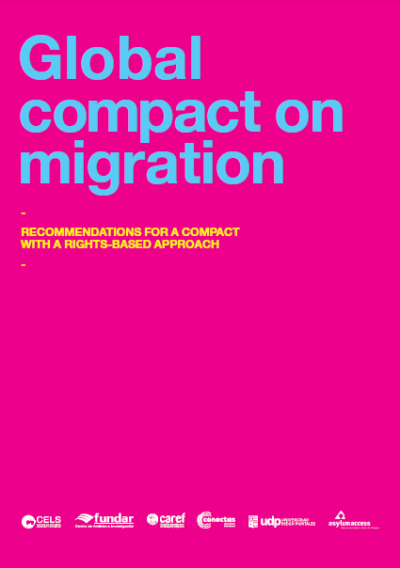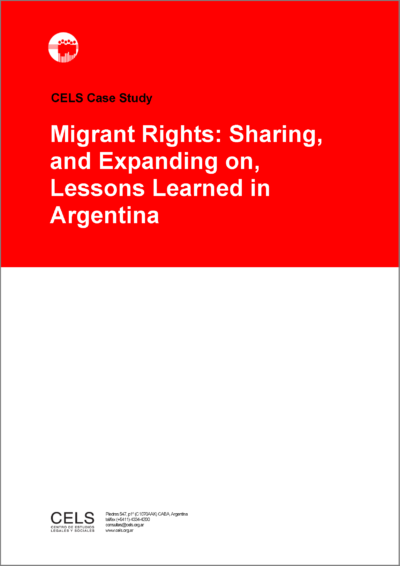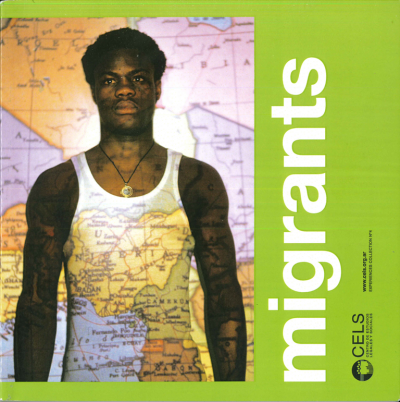Migrants: serious human rights violations at international borders
Alongside 195 organizations worldwide, we demand that the UN establish an independent monitoring mechanism to investigate the treatment of migrants in border areas and its underlying structural causes.
End of a policy that never should have existed
We applaud the Executive Branch’s decision to repeal DNU 70/2017, the implementation of which posed a clear setback for migrant rights in the country over the past four years. The annulment of this decree is a fundamental step towards equality, the right to migrate and towards the recognition of the State’s obligation to regulate migration.
Deported Mother Granted Return to Argentina to Reunite with Children
Vanessa’s deportation is proof of the inherent threats involved in Argentina’s immigration policy as modified by presidential decree. The decision to revert her expulsion is a step forward towards the restauration of children’s rights.
UN urges Argentina to derogate and suspend decree that violates migrant rights
The Committee of the Convention on Migrant Workers (CMW) determined that the decree breaches international treaty ratified by Argentina in 2007.
Petition filed to the Inter-American System so a woman expelled from Argentina can be reunited with her children
The lawyer of Vanessa Gómez Cueva, Juan Martín Villanueva, along with Amnesty International, la Comisión Argentina para Refugiados y Migrantes (CAREF), the Center for Justice and International Law (CEJIL) and CELS, requested a precautionary measure so that she and her small child can reunite with their family.
Alert to backsliding on migration policies
A group of organizations submitted information to the IACHR on the migration policies of the provincial governments of Jujuy and Chubut. We also provided details regarding a series of expulsions of migrants.
The Global Compact for Migration was adopted
More than 160 UN member countries endorsed the Global Compact for Migration at an intergovernmental conference held on December 10-11. This agreement includes some important advances, above all in a context of growing xenophobia and nationalism in Latin America and the world.
Global Compact for Migration: Progress, shortcomings and the way forward
The new Global Compact represents a turning point in the international management of migration. But much work remains to ensure that its implementation is focused on the protection of the rights of migrants.
Treating migration as a security problem violates human rights
During the final round of negotiations on the Global Compact for Migration, 40 organizations urged UN member states to ensure that the accord fully incorporate a rights-based approach. The last draft includes changes that reinforce a focus on control and security. If this is validated, countries will have wasted a historic opportunity to fuel a paradigm shift.
Response to the US about its withdrawal from the UN Human Rights Council
The US ambassador to the UN said that her country’s decision to abandon the Human Rights Council was partly due to the opposition of 18 organizations to the Council reform proposal backed by Washington. CELS, one of these organizations, responded to her.
Global Compact negotiations: States discuss migratory regularization
At the fourth of six rounds of negotiations on the Global Compact for Migration, state delegations from various regions defended the importance of addressing regularization procedures.
A Global Compact to return migrants?
The latest draft of the Global Compact for Migration avoids mentioning the regularization of those who are already living in their destination country, which is a serious omission. Opinion piece by Camila Barretto Maia, Diego Morales y Raísa Ortiz Cetra.
“Urgent” decree on migrants declared unconstitutional by the judiciary
The judges determined that the Decree of Necessity and Urgency (DNU) adopted by the national government to modify the country’s Migration Law is unconstitutional because it does not comply with the requirements for this kind of decree and because the changes go against migrants’ rights.
Global Compact for Migration: Stop the hypocrisy and listen to the Global South
UN member states began negotiations on the Global Compact for Migration. This agreement represents an unprecedented opportunity to establish specific obligations for protecting the human rights of migrant persons, but the process faces numerous challenges. Opinion piece by Camila Barretto Maia, Diego Morales and Raísa Ortiz Cetra.
Global Compact on migration: Presenting proposals centered on the rights of migrants
At the UN, States will begin negotiating the Global Compact on migration. CELS and five other organizations present concrete measures that the Compact should include to guarantee migrants’ rights.
Human Rights in Argentina: Our 2017 report in broad strokes
Argentina is known globally for its hard-fought Memory, Truth and Justice process over the crimes committed during the 1976-1983 dictatorship. But numerous other human rights achievements have been enshrined in the country’s constitution, laws, regulations and jurisprudence over the years. Today, some of those are at risk.
Global compact on migration: Recommendations for a compact with a rights-based approach
Autor/a: Various
45 pgs.
ver más
WTO in Buenos Aires: Petitions for habeas corpus, habeas data and access to information
What information was gathered to decide which activists and organizations should be kept from participating in the WTO Ministerial Conference, and how was it collected? We present a set of habeas data petitions and a request for access to information.
Debate on the Global Compact: Human Rights Must Guide Migration Policies
The Global Compact on migration could be an unprecedented intergovernmental tool but the majority of states have expressed an interest in intensifying the current model, centered on controls and security, instead of transforming it.
“Migration policies achieve the opposite of what official discourse claims to seek”
In 2016, more than 5,000 migrants died in the Mediterranean. Many were attempting to reach the southern border of Spain, where deaths, disappearances and people wandering in search of their family members are a daily scene. Carlos Arce Jiménez, in Argentina under an agreement between the University of Córdoba (Spain), the University of Lanús’s Institute of Justice and Human Rights and CELS, talked to us about the responsibility of migration and border policies in this crisis.
A Global Compact on the rights of migrant persons
“Regulating migration” must stop being equated with impeding or criminalizing migrants. In regional and international forums, we promote alternative models that guarantee their rights.
Migrant Rights: Sharing, and Expanding on, Lessons Learned in Argentina
Autor/a: CELS
4 pgs.
ver más
IACHR hearing: Argentine state unable to justify the DNU on migrants
The Decree of Necessity and Urgency (DNU) on migrants associates migration with crime, basing its assessment on partial, decontextualized data. This promotes xenophobia and stigmatizes migrants.
While Argentina’s government furthers the stigmatization of foreigners, our organizations request dialogue
More than 150 organizations requested an urgent meeting with Argentine Cabinet Chief Marcos Peña, in order to propose to him that any modification to the Migrations Law must be debated in the multiple spaces that exist for this purpose, from working groups all the way to Congress.
Migrants in check: an immigration reform outside the law
The draft Decree of Necessity and Urgency (DNU) that we gained access to changes the paradigm of the current law and is a setback for migrant rights.
International debate on migration: Concrete action is needed in this critical situation
High-level plenary meeting on addressing large movements of refugees and migrants. United Nations General Assembly.
Irregular migration status is not a reason for detention
The government will build and open a migrant detention center, as a tool to “combat irregularity” and for situations beyond those specifically established by the Migration Law and its detailed regulations.





